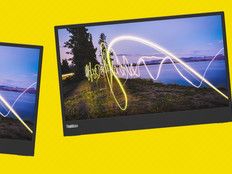Mac of All Trades
When Steve Whittekiend was hired five years ago as the first IT director for Washington City, Utah, he had an opportunity to completely transform the enterprise computing environment. He made the most of it, moving from PCs to Macs.
At the time, the city had a mix of Microsoft Windows PCs in many departments. "I spent the first year formatting these PCs because they had what I call ‘PC rot' -- they got slower and slower over time," Whittekiend says. "Plus, Windows XP was on its way out."
Whittekiend carefully considered his options and soon announced plans for an extreme change: an almost complete switch in the base operating system, not from XP to Vista but from Windows to Mac OS X.
"To me, the Mac was far superior to anything from the competition," he recalls, noting that he made the shift to the new platform slowly yet steadily to give users a chance to adapt.
Today, Whittekiend manages 80 iMacs, MacBook Pros and Apple Mac minis. City workers are enamored with the speed, stability and flexibility the new platform offers, especially the built-in iChat application, which enables seamless collaboration and video conferencing across departments. Only two users occasionally pine for their PCs.
"Our users can do their jobs faster and more productively; they can communicate and collaborate better; and they can be more innovative in how they do their work," Whittekiend says. Some users have Apple iPhones and iPads, and he plans to expand that deployment to increase mobility and enable a paperless environment. "The stuff we can do now is just amazing," he says.
Whittekiend's decision may have seemed radical five years ago, but today it would be viewed as downright trendy. State and local governments are increasingly switching the majority of their computing environments to Macs, or at a minimum, integrating Apple devices into their IT mix.
Mac Attack
For most of the past two decades, the Macintosh hadn't really factored into enterprise computing, having been viewed as ideal mostly for consumer applications or niche users, such as graphic artists.
But according to a 2010 study from analyst firm ÂInformation Technology Intelligence Corp. (ITIC), 450 large organizations now report that they are using Mac OS X on 28 percent of desktops and notebooks, making it the second most prevalent operating system in use today behind Windows.
"Macintosh use in the enterprise has experienced a very steady and sustainable increase year over year for the past several years," says Laura DiDio, principal analyst for ITIC. She credits several factors for the trend.
Without question, the consumer popularity of the iPod and iPad propelled the resurgence of Macs in the enterprise. Mobility and remote users are on the rise, and many IT administrators aiming to keep a lid on capital expenditures allow workers to use their personal devices for government business.
Then there's the security fatigue associated with the overwhelming threat of viruses and malware aimed almost exclusively at Windows machines. DiDio says that the effort to prevent and treat viruses has become so administratively burdensome and cost-intensive that many organizations are simply giving up and switching to Macs, which are largely immune to viruses.
Finally, thanks to the availability of Macs with Intel processors, the computers can run both Mac and Windows programs using virtualization or a dual-boot configuration.
"There's really a big case to be made for Apple now," DiDio says.
The Mobile County District Attorney's Office in Alabama has been a Mac shop since 1995. Lisa Lemler, technology administrator, says that the biggest benefit of Macs is cost and maintenance. "You pay a little bit more in the beginning, but the maintenance on Macs is so simple that at present for about 65 employees, we need only two IT people," she says. "If we were using Windows, that ratio would be quite a bit higher."
Whittekiend agrees that the switch represents a better long-term value proposition. Macs generally cost more upfront, but many features that must be added to the final cost of a PC come standard on a Mac, such as high-end graphics cards. And the computers themselves last much longer without any loss of performance, making them ultimately more cost-effective.
Washington City's users continue to work on Macs purchased in 2005. "They still run the most modern software programs," Whittekiend says, noting that the only request for a new machine was based on the user's need for a larger monitor.
Other organizations prefer the Mac because its versatility in running two different operating systems at the same time gives them the best of both worlds. Oliver Sanidas, associate director of digital services at the Arapahoe Library District in Englewood, Colo., standardized on Apple hardware so he could offer a choice of applications to public library patrons.
The district now has Intel Macs at each of its eight libraries, with at least one computer devoted exclusively to Mac apps and the rest running virtualized Windows. The library also uses Parallels Desktop for Mac to virtualize its Windows-based library information management system and other administrative functions.
Sanidas maintains that another advantage of the Mac is hardware stability and superior technical support. "No matter what the problem, we bring it to an Apple Store and they are very prompt to fix it," he says. "We have a much more reliable set of computers now than we've ever had before."
70%
The percentage of large organizations that expect to have at least some Macs in their enterprise by the end of 2011, up 5 percent from 2010
Source: "The Mac in the Enterprise: Survey Results for 2011," Enterprise Desktop Alliance
No Hurdle Too High
Bringing the Mac into state and local governments is not without its challenges. Whittekiend had to work out several bugs related to software compatibility between his Macs and the city's Windows-based Exchange server, for example.
Many other organizations are forced to continue running some PCs for proprietary applications, or those for which Mac-compatible versions are unavailable. The Mobile County DA's office has to maintain a single PC in order to search the National Crime Information Center database, and Washington City police cruisers are outfitted with netbooks because officers rely on a Windows-based law enforcement application.
Another challenge, DiDio says, is that Apple support is geared toward consumers rather than enterprises. "You've not had a lot of third-party suppliers or Apple itself investing in enterprise-level management products," she says. "If Apple is going to continue to make headway with large organizations, they're going to have to make a commitment to put more skin in the game in terms of enterprise-level support."
Go to statetechmag.com/Macs111 to discover tips for easing the transition to Macs.
Even Sanidas, who raves about Apple's technical support, says that his good experience is likely tied to his location just outside of metropolitan Denver, where he has access to several Apple stores. "I don't know that you're going to get that same benefit when you don't have the ability to drive up to a mall, drop off your computer and get it fixed," he admits.
Still, Mac proponents say that any challenges are greatly offset by the platform's performance and flexibility. Lemler says any issues can be quickly solved and is blunt about why her office has remained with the Mac even as the majority of government agencies have tilted heavily toward Windows: "The Mac just works. It's excellent."
Whittekiend has overcome the few hurdles he's encountered without much difficulty and says that confirms for him that his original decision was the right one. "Bottom line," he says, "the longevity, the flexibility, the built-in tools and features, and the value just makes the Mac unbeatable."







